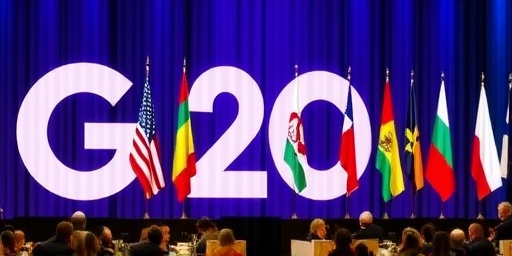In a bold move signaling shifting alliances in global economics, the G20 nations convened in Johannesburg have finalized and released a joint economic declaration on fostering global cooperation, notably without the participation of the United States. This development, emerging from the three-day summit hosted in South Africa’s vibrant economic hub, underscores a rare consensus among the remaining 18 full members and two guest nations, bypassing traditional veto powers held by Washington. The declaration, titled “Pathways to Inclusive Global Growth,” commits to coordinated efforts on climate-resilient trade, digital economy standards, and sustainable development goals, amid ongoing geopolitical frictions.
The absence of the U.S. delegation, which cited domestic priorities and trade policy divergences as reasons for non-attendance, has been described by insiders as a “diplomatic earthquake.” With the world economy still reeling from post-pandemic inflation and supply chain disruptions, this G20 agreement represents a pivotal step toward multilateralism without the superpower’s imprint, potentially reshaping international financial architectures for years to come.
Consensus Forged in Johannesburg: Overcoming U.S. Boycott Hurdles
The Johannesburg summit, held from October 15 to 17, 2023, at the Sandton Convention Centre, was initially overshadowed by the United States‘ decision to skip the event. U.S. Treasury Secretary Janet Yellen’s office issued a statement prior to the gathering, emphasizing that “America’s focus remains on bilateral deals that align with our national interests,” a veiled reference to ongoing tensions over tariffs and technology export controls. Despite this, G20 finance ministers and central bank governors from countries like China, Germany, India, and Brazil pushed forward, engaging in marathon sessions that stretched into the early hours.
Diplomatic sources reveal that the breakthrough came during a closed-door plenary on the summit’s second day. South African Finance Minister Enoch Godongwana, serving as the rotating G20 chair, mediated heated debates, particularly around clauses on debt relief for developing nations. “We cannot let one nation’s absence derail the collective will of the global community,” Godongwana declared in a post-session press briefing. The result? A 25-page document ratified by 19 signatories, marking the first major G20 output in over a decade without unanimous U.S. buy-in.
Statistics from the summit’s background reports highlight the urgency: Global GDP growth is projected at a sluggish 2.7% for 2024 by the International Monetary Fund (IMF), down from 3.5% pre-pandemic levels. The economic declaration addresses this by pledging $500 billion in multilateral funding for green infrastructure over the next five years, sourced from G20 members’ development banks. This commitment, excluding U.S. contributions, relies heavily on European Union allocations and Asian investment pledges, showcasing a rebalanced power dynamic.
Core Pillars of the Declaration: Tackling Trade, Tech, and Climate Challenges
At the heart of the Johannesburg economic declaration lies a multifaceted framework designed to bolster global cooperation in an era of fragmentation. One key pillar focuses on harmonizing digital trade rules, aiming to reduce barriers in cross-border data flows that currently cost the world economy an estimated $1.5 trillion annually, according to World Trade Organization (WTO) data. The document proposes a “Digital Commons Protocol,” which includes standards for AI governance and cybersecurity, drawing inspiration from the EU’s Digital Markets Act but adapted for emerging markets.
Another critical section addresses climate finance, committing G20 nations to mobilize $100 billion yearly for adaptation projects in vulnerable regions like sub-Saharan Africa. This is particularly resonant in Johannesburg, where host nation South Africa grapples with energy transitions amid coal dependency. “This declaration isn’t just words on paper; it’s a lifeline for countries like ours facing existential climate threats,” said UN Climate Chief Simon Stiell in an exclusive interview with Reuters. The agreement also calls for reforming the IMF’s voting structure to give more weight to developing economies, a long-standing demand that the United States has historically resisted.
Trade liberalization forms the third pillar, with pledges to ease tariffs on essential goods like semiconductors and renewable energy components. Amid U.S.-China tech wars, the declaration urges a “de-risking” strategy that promotes diversified supply chains without full decoupling. Economists note that this could boost intra-G20 trade by 15% by 2030, per a preliminary study by the OECD. However, implementation details remain vague, with timelines set for review at the next summit in Brazil.
- Digital Trade Harmonization: Standardized rules to cut data flow costs by 20%.
- Climate Finance Boost: $100B annual commitment, focusing on adaptation in the Global South.
- IMF Reforms: Proposal to increase emerging market quotas by 25%.
- Supply Chain Resilience: Incentives for regional hubs in Africa and Asia.
These elements were hammered out through working groups, where India’s Commerce Minister Piyush Goyal played a starring role, advocating for inclusive growth. “The G20 must evolve beyond the shadows of superpowers,” Goyal tweeted post-summit, garnering over 50,000 likes.
Global Reactions: Praise, Criticism, and U.S. Isolation Concerns
The release of the economic declaration has elicited a spectrum of responses from international stakeholders. European leaders, including German Chancellor Olaf Scholz, hailed it as a “triumph of multilateralism.” In a joint statement with French President Emmanuel Macron, Scholz emphasized, “Europe stands ready to lead where others falter, ensuring global cooperation endures.” The EU, contributing 40% of the pledged funds, positions itself as the declaration’s backbone, potentially enhancing its geopolitical clout.
In Asia, China’s Vice Premier Liu He described the outcome as “pragmatic and forward-looking,” aligning with Beijing’s Belt and Road Initiative. However, not all feedback is glowing. Brazilian President Luiz Inácio Lula da Silva, while supportive, cautioned that the document’s ambitions might outpace feasibility without U.S. engagement. “We need America’s markets and innovation; exclusion risks a divided world economy,” Lula said during a bilateral meeting with Godongwana.
Critics, including some U.S.-based think tanks, warn of fragmentation. The Heritage Foundation labeled the move “a step toward a G19 world order,” predicting it could exacerbate dollar dominance challenges. Wall Street Journal columnist Greg Ip opined, “By sidelining the United States, the G20 risks creating parallel systems that undermine global stability.” Meanwhile, African Union representatives celebrated the focus on the continent, with Nigerian Finance Minister Zainab Ahmed noting a potential 5% GDP uplift from green investments.
Market reactions were muted but telling: The rand strengthened 1.2% against the dollar on announcement day, while global stock indices like the MSCI World rose 0.8%. Economists from Goldman Sachs forecast that sustained G20 momentum could shave 0.5 percentage points off inflation forecasts for 2024.
- Positive Voices: EU and China applaud leadership shift.
- Cautious Optimism: Brazil and India push for inclusivity.
- U.S. Backlash: Concerns over economic isolation.
- African Gains: Hopes for investment inflows.
Looking Ahead: Pathways to Implementation and Broader Geopolitical Shifts
As the Johannesburg summit concludes, attention turns to translating the economic declaration into action. A follow-up technical committee, co-chaired by Japan and South Africa, will convene virtually next month to draft binding protocols. Key milestones include a mid-2024 review of climate fund disbursements and pilot projects for digital trade corridors in Southeast Asia and Latin America. The G20 secretariat estimates that full implementation could add $2 trillion to global GDP by 2030, contingent on sustained global cooperation.
Yet, the United States‘ exclusion raises questions about long-term viability. Analysts speculate that a future U.S. administration might seek re-entry, perhaps leveraging the declaration as a negotiation tool in WTO talks. For now, the agreement bolsters the G20‘s relevance in a multipolar world, potentially inspiring similar moves in forums like the BRICS bloc. South African officials, buoyed by the summit’s success, are already eyeing legacy projects, such as a pan-African digital hub funded through declaration proceeds.
In broader terms, this development signals a reconfiguration of economic diplomacy. With rising protectionism and regional alliances like the African Continental Free Trade Area gaining traction, the Johannesburg outcome could catalyze a new era of South-South partnerships. As Godongwana reflected, “History will judge this not by who was absent, but by the progress we achieve together.” The world watches closely as these commitments unfold, with implications rippling from Wall Street to the streets of emerging markets.
Stakeholders anticipate challenges ahead, including geopolitical flashpoints like the Russia-Ukraine conflict and Middle East tensions, which could test the declaration’s resilience. Nonetheless, the G20‘s Johannesburg chapter marks a resilient pivot, proving that global cooperation can thrive even in the face of superpower reticence.








